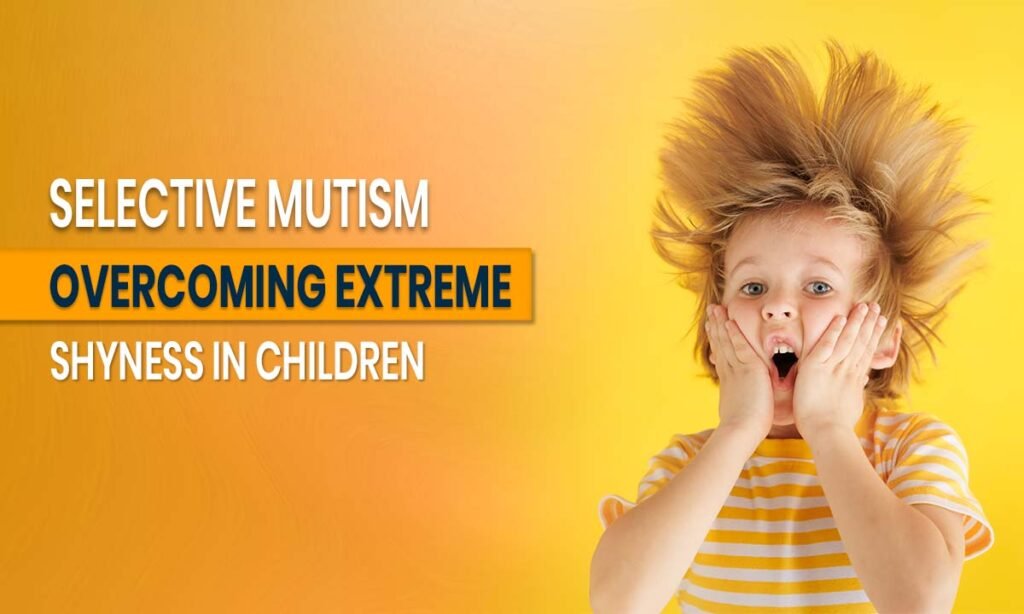
Understanding Selective Mutism: The Struggle and the Solution
Selective mutism is a complex disorder often misunderstood as extreme shyness. It goes beyond simple introversion, significantly impacting children’s ability to speak in certain social settings. It’s a silent battle that can affect school performance, social interactions, and overall development. If left unaddressed, selective mutism can lead to lifelong challenges, including ongoing childhood anxiety and issues in social settings.
But here’s the good news: Selective mutism treatment is not only possible, but it can be highly effective. From therapeutic approaches to building confidence in children, there are many ways to help them regain their voices. If you’re struggling to find solutions for your child, it’s crucial to address this issue early with professional help.
Today, we dive deep into selective mutism, childhood anxiety symptoms, and how to navigate this journey toward recovery. Stay with us as we explore how to overcome the silence and lead your child to a more confident future.
What Is Selective Mutism?
A Silent Struggle
Children with selective mutism experience a form of childhood anxiety that causes them to be unable to speak in certain social situations, even though they can speak comfortably in other environments, such as at home with family. It’s not a behavioral choice or intentional shyness; rather, it’s a significant psychological condition that affects their ability to communicate in specific settings like school or social gatherings.
It often starts in early childhood, usually around the ages of 3 to 5, and if left untreated, it can lead to more severe childhood anxiety as the child grows. However, it is possible to manage and overcome this disorder with proper selective mutism treatment.
What Causes Selective Mutism?
The Role of Childhood Anxiety
We don’t fully understand the exact causes of selective mutism disorder, but childhood anxiety plays a central role. Children with this disorder may have heightened levels of anxiety, which prevents them from speaking in certain situations. Common triggers include new environments, unfamiliar people, or situations where they feel judged or uncomfortable.
It’s important to recognize the signs early so that selective mutism treatment can begin before the anxiety grows into more severe forms of mental health concerns, such as social phobia or generalized anxiety disorder.
Symptoms of Selective Mutism
How to Identify the Signs
The main symptom of selective mutism is the inability to speak in specific social situations, despite speaking freely in more familiar and comfortable environments. Common symptoms include
- Silent in social settings: The child might not speak at school or in large group settings.
- **Signs of extreme childhood anxiety:** Sweating, shaking, or avoiding eye contact.
- Social isolation: The child may retreat from other children or avoid activities requiring verbal communication.
- Reluctance to engage: Children may show hesitation or distress at the thought of speaking in public.
By recognizing these childhood anxiety symptoms, parents and teachers can take the first step in supporting the child.
Selective Mutism Treatment: A Path to Overcoming Anxiety
Treatment Options for Selective Mutism
While selective mutism can be a challenging condition, the good news is that it’s highly treatable. There are several approaches that can help children regain their ability to speak in social situations, including
- Behavioral Therapy
One of the most common and effective treatments for selective mutism is behavioral therapy. This therapy focuses on helping children gradually become more comfortable with speaking in different social situations through exposure and positive reinforcement. - Cognitive Behavioral Therapy (CBT)
CBT is a type of selective mutism treatment that helps children address the anxiety that leads to mutism. It teaches them how to challenge negative thoughts and gradually build confidence in their ability to communicate. - Family Therapy
Since selective mutism disorder often affects the whole family, family therapy can provide the necessary support for everyone. Parents and siblings can learn how to encourage communication in a supportive, anxiety-reducing environment. - Speech Therapy
In some cases, speech therapists work with children to develop their communication skills, helping them feel more confident when speaking. - Medication
In severe cases, doctors may prescribe medication to help reduce the childhood anxiety symptoms that contribute to the mutism. However, doctors typically use medication as a final option when other treatments have proven ineffective.
By addressing selective mutism disorder with these therapies, many children can overcome their struggles and lead more fulfilling, communicative lives.
How Selective Mutism Affects Adults
The Lifelong Impact of Selective Mutism
Children primarily diagnose selective mutism, but if left untreated, it can persist into adulthood. Selective mutism in adults often manifests as extreme discomfort in social situations or in professional settings where verbal communication is required.
Adults with selective mutism may struggle with:
- Professional challenges: Difficulty participating in meetings, giving presentations, or interacting with colleagues.
- Social isolation: Avoiding gatherings, parties, or even casual conversations due to anxiety.
- Emotional distress: The emotional toll of trying to navigate a world that requires verbal communication can cause significant distress and frustration.
However, just like in children, selective mutism treatment for adults is highly effective. Therapy, particularly cognitive behavioral therapy, can help adults learn how to manage their anxiety and improve their ability to communicate in social situations.
A Luxury Treatment for Selective Mutism: Athena Luxus
How Athena Luxus Can Help
At Athena Luxus, we provide premium mental health services tailored to the individual needs of each patient. Whether you are seeking treatment for selective mutism disorders or other mental health concerns, such as childhood anxiety, our luxury treatment options offer exclusive and effective solutions.
Our experienced therapists specialize in treating selective mutism, using a combination of cognitive behavioral therapy, family therapy, and other premium treatment approaches. With a luxury facility and a team of highly trained professionals, Athena Luxus is your best choice for overcoming anxiety and finding peace.
Why You Should Take Action Today
The Best Time to Seek Help
If you’re struggling with selective mutism or childhood anxiety, don’t wait for things to get worse. The sooner you address the issue, the better the chances for success. Treatment for selective mutism can significantly impact your child’s development and future well-being.
Remember, if you’re suffering from addiction or childhood anxiety, or you simply need a professional evaluation, Athena Luxus is here to support you every step of the way. We offer exclusive, luxury care to help you recover and live a more fulfilling life.
Conclusion: A Path to Confidence
Remember, if you or your child is suffering from selective mutism or childhood anxiety, it’s essential to seek professional help as soon as possible. Athena Luxus offers exclusive, luxury treatments to help you overcome these challenges and lead a confident life.
If you’re looking for a comprehensive treatment plan, don’t hesitate to reach out to us. Book your appointment today and start your journey toward recovery.
Facing these difficulties? Whether it’s for you or someone you know, our tailored treatment plans can help. Our programs focus on
Drug Addiction Treatment
Heroin Addiction Treatment
MDMA Addiction Treatment
Meth Addiction Treatment
Patient Experiences
Ravi Sharma, Delhi: I struggled with selective mutism for years. After attending Athena Luxus, I feel like a new person. The therapy was premium and effective. I can now speak confidently in public.
Neha Patel, Mumbai: I’ve been living with childhood anxiety for as long as I can remember. Athena Luxus provided the luxury treatment that helped me understand my fears and work through them. Highly recommend.
Kiran Verma, Pune: I never realized how selective mutism disorder was affecting my adult life until I came to Athena Luxus. Their treatment approach was exactly what I needed.
Deepika Reddy, Bangalore: As a child, I faced selective mutism in school. Athena Luxus helped me overcome that anxiety with personalized care. I now live a much more confident life.
Facing these difficulties? Whether it’s for you or someone you know, our tailored treatment plans can help. Our programs focus on
Frequently Asked Questions (FAQs)
How do I stop selective mutism?
The best way to stop selective mutism is through cognitive behavioral therapy, exposure therapy, and a supportive environment.
Can selective mutism be healed?
Yes, we can effectively manage and even overcome selective mutism with proper treatment.
What is the best treatment for selective mutism?
Cognitive and behavioral therapy are often the most effective treatments for selective mutism disorders.
What are some therapy goals for selective mutism?
The primary goal is to reduce anxiety and help the child speak comfortably in social situations.
What are some treatments for selective mutism with anxiety?
Cognitive behavioral therapy, speech therapy, and family therapy are effective treatments for selective mutism accompanied by childhood anxiety.

